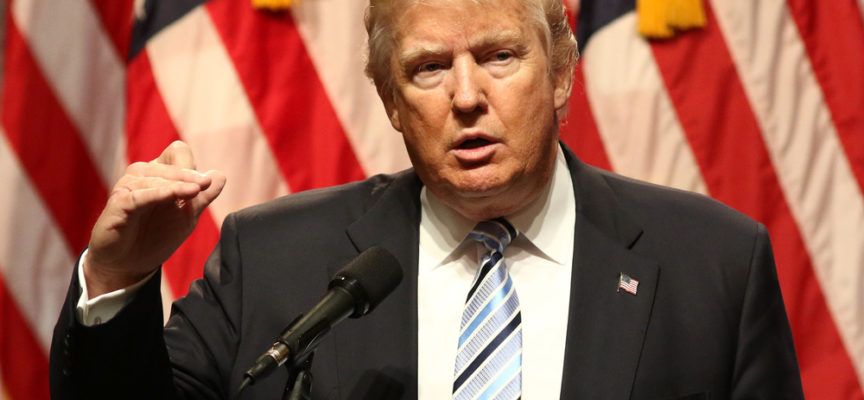In light of breaking news that President Trump plans to renegotiate, rather than terminate, the terms of NAFTA, commentators are speculating once again about a split inside the Trump administration between aides with nationalist and globalist orientations.
Mr. Trump dismissed talk about a split, saying, “Hey, I’m a nationalist and a globalist,” he said. “I’m both. And I’m the only one who makes the decision, believe me.”
With the President apparently evaluating the positives and negatives of nationalism, it is time for evangelical conservatives to seize the moment by encouraging him to embrace a healthy patriotism (which is sometimes called “civic nationalism”) but reject ethno-nationalism and maintain a critical distance from strict economic nationalism.
We should embrace a healthy type of civic nationalism (patriotism).
When political scientists refer to “civic nationalism,” they are describing what most American citizens refer to as “patriotism.” A healthy American patriotism believes in the “ideas” that make us a nation, ideas such as religious liberty, freedom of speech, checks-and-balances on centralized power, and justice and equality for all citizens—including citizens who are born or unborn, black or white, rich or poor. Historically, patriotic Americans have often affirmed the Judeo-Christian moral framework that exercised such a profound influence on our founding ideals and documents.
Evangelicals should embrace this sort of patriotism, uniting around the good that is found in our founding ideals and documents, and our nation’s diverse citizens. There is nothing wrong, and everything right, about having a healthy affection for our own nation, in spite of its flaws. Yet, our “yes” is qualified, because our patriotism is not uncritical; not only should we love our nation enough to admire and preserve the good in it, but also enough to resist and stand guard against that which is unjust, evil, and uncivil.
We should reject ethno-nationalism (racism).
When political commentators talk about ethno-nationalists, they are referring to citizens who wish to privilege one ethnic group in our country over all the others. Ethno-nationalists emphasize what they consider to be the exemplary and unique traits of their ethno-nation (the traits may be real or imaginary, or a mixture of real and imaginary). They demand that these traits be preserved and transmitted to future generations. Ethno-nationalists tend to maintain a double standard for justice, privileging the members of the entitled ethnic group over those of other ethnic groups.
Ethno-nationalism runs afoul of a genuinely Christian theory of politics. This theory views the state as an institution that exercises power with an eye toward justice for all people within its borders, and not merely for people of a particular ethnic, socioeconomic, or religious grouping. “The danger of the ethnic variety of nationalism lies,” writes political scientist David Koyzis, “in the pursuit of a double standard of justice. When ethnic nationalists come to power in a given state, they privilege the members of their…ethnic group over those of other ethnic groups.” Evangelicals should thus reject any attempt to value one ethnic group over another. We should fight racism tooth-and-nail, in all its forms, not only from the voting booth but also in the public square.
We should maintain a critical distance from strict economic nationalism.
In the midst of a global economic recession and large-scale immigration, a type of economic nationalism has arisen in opposition to globalism, and usually in combination with either ethnic nationalism or civic nationalism. In fact, this impulse toward economic nationalism is so strong that, during the 2016 election cycle, it reoriented the long-standing political divide in our nation from “conservative vs. progressive” to “open country vs. closed country.” Economic nationalism takes a more isolationist position closing the borders, restricting free trade, and intervening in the domestic economy.
Economic nationalists are right to help blue-collar and financially-disadvantaged citizens who have borne the brunt of globalization’s negative side effects, and they should be commended for recognizing the extent of the problem before many of us did.
As important as good intentions are, however, our evaluation should be based on probable outcomes: will economically-nationalist policies end up helping the disadvantaged or will they harm them in the long run? Although the jury is still out, most economists suspect it will create at least as many problems as it solves. Although international trade does pose a challenge for economic stability, especially for working class Americans, we should consider that the solution might not be economic isolationism, on the one hand, or more federal intervention in the economy, on the other.
Conservative and Patriotic, but Not Ethnically or Economically Nationalist
The best way to be an evangelical and a political conservative is to give a firm “yes” to proper forms of patriotism, a decisive “no” to ethno-nationalism, and a “probably not, but I share your motivation to help the financially disadvantaged” to economic nationalism. In doing so, we can speak a helpful word during this watershed moment in American politics, a moment that will probably determine the course of the Republican Party for decades to come. Hopefully, President Trump will do the same.
Subscribe
Never miss a post! Have all new posts delivered straight to your inbox.







